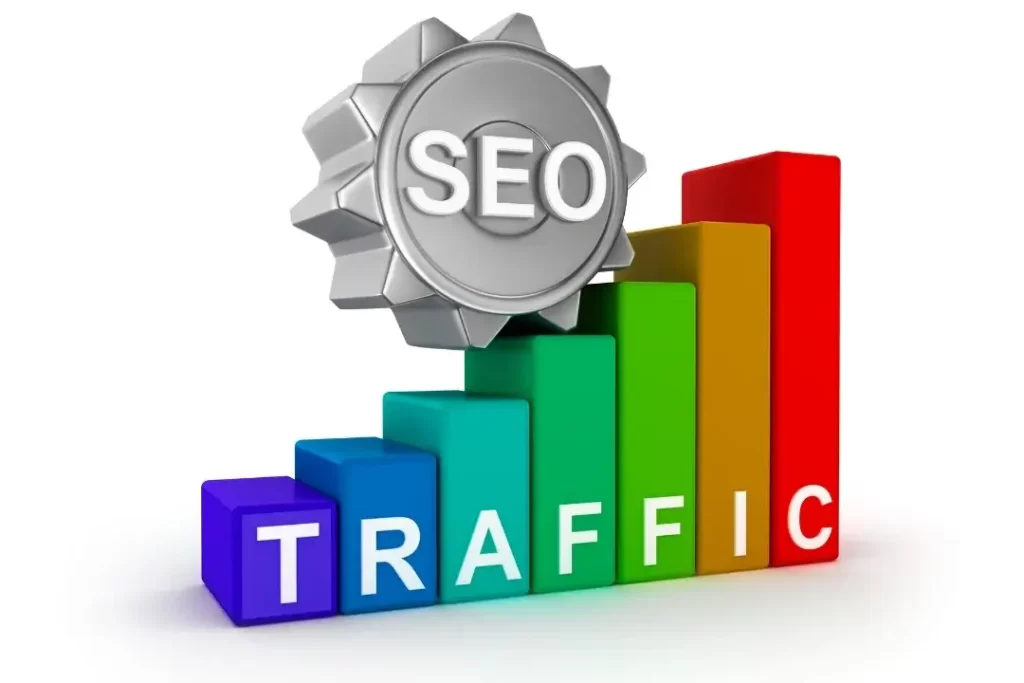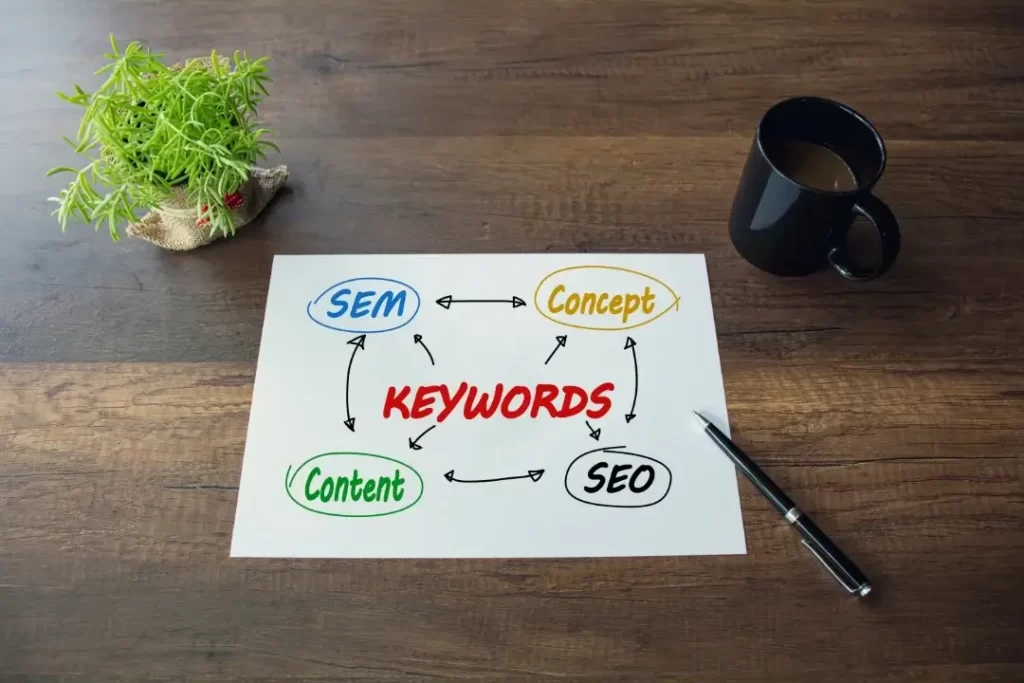
The Ultimate Guide to 17 Types of Keywords You Can't Ignore
"Discover, Target, Succeed: The Power of Keywords Revealed!"
3.5 billion searches are carried out on Google every day. That’s billions of people actively seeking information, products, or services, and guess what? Your website could be the answer they’re looking for. This alone underlines keywords’ critical role in the digital marketing landscape. But what are keywords , and what are the types of keywords in SEO?
In this comprehensive guide, we’ll journey through the intricate world of keywords, exploring their definitions, significance, and various types that every marketer should know.
What are keywords in SEO?

Keywords in SEO are the words and phrases that searchers enter search engines, also called “search queries.” They act as a conduit, connecting your audience to your online content. In simpler terms, if you were a library, keywords would be your catalog system.
Keywords are the lifeblood of SEO. They are the words or phrases visitors type into a search engine when looking for information, products, services, or answers to their questions. Keywords play an essential role in SEO because they help search engines acknowledge what your content is about, which helps to decide where to rank your content in search results.
Why Are Keywords Important?
Keywords are the backbone of SEO. Their importance can’t be overstated as they guide your content strategy, help attract targeted traffic, and improve your site’s ranking. When used accurately, keywords can help your audience find you amongst the vast ocean of digital content.
Keywords are important because they connect what people are searching for to the content you provide to fill that need. Your aim in ranking on search engines is to direct organic traffic to your website from the search engine result pages (SERPs), and the keywords you select to target will determine the kind of traffic you get.
Keywords are the lifeblood of SEO, and their importance cannot be overstated. Here’s why they are vital:
Visibility and Traffic

Keywords are the primary means by which potential visitors can discover your website. When your content aligns with users’ search queries, search engines like Google are more likely to display your website in their search results, driving organic traffic to your site.
Relevance and User Experience
Well-optimized keywords ensure that your content is relevant to the needs and interests of your target demographic. This relevance enhances the user experience, increasing the likelihood of user engagement, such as longer time spent on your website and lower bounce rates.
Competitive Advantage
Effective keyword research allows you to uncover valuable insights about your industry and competitors. By targeting keywords strategically, you can position your website ahead of competitors in search engine rankings.
Conversion Potential
Keywords can help you identify user intent. Understanding whether users are searching for information, products, or services allows you to tailor your content and marketing efforts to reach their specific needs, increasing your chances of conversion.
Data-Driven Decision Making
Keywords provide valuable data and insights into user behavior. Analyzing keyword performance can help you refine your content strategy, track trends, and adapt to changes in user search habits.
Now that we’ve established the importance of keywords, let’s explore how many keywords every savvy marketer should be acquainted with.
Discover the 17 Must-Know Types of Keywords Every Marketer Should Know
Keywords come in various shapes and sizes, each with unique characteristics and role in SEO. Understanding these different types of keywords in SEO is crucial for creating a well-rounded SEO strategy that caters to a broad spectrum of user intent. Let’s explore them in detail:
Types Of Keywords By Length
1. Short Tail Keywords

Short tail keywords, also known as ‘head terms,’ usually comprise one or two words. These keywords have a high search volume but also face high competition. While they can help drive large traffic to your website, their broad nature may not attract the most relevant audience.
Key Characteristics of Short Tail Keywords
- Brevity: Short-tail keywords are concise and typically contain only one or two words. For example, “shoes,” “travel,” or “cars” are all short-tailed keywords.
- High Search Volume: Short-tail keywords often receive many searches due to their simplicity and broad appeal. This high search volume can make them attractive targets for businesses seeking to increase website traffic.
- High Competition: The popularity of short tail keywords means that many websites and advertisers are vying for top positions in search engine results pages (SERPs). Consequently, competition for these keywords can be fierce.
- Broad Nature: Short tail keywords are general and lack specificity. This can make it challenging to target a particular audience or demographic. For instance, if your website sells running shoes, the short tail keyword “shoes” may attract a wide range of users interested in various types of footwear, not necessarily those interested in running shoes.
Examples of Short Tail Keywords
“Travel”: This broad keyword could encompass various travel-related topics, such as destinations, booking services, or travel tips.
“Health”: A highly competitive short tail keyword that can relate to various aspects of health, including fitness, nutrition, and medical information.
“Smartphones”: This keyword encompasses all types and brands of smartphones, making it a broad category with numerous potential search intents.
Pros and Cons of Short Tail Keywords
Pros:
- High Traffic Potential: Short-tail keywords can drive significant traffic to your website due to their popularity.
- Brand Visibility: Ranking for popular short-tail keywords can enhance your brand’s visibility and authority in your industry.
Cons:
- High Competition: The fierce competition for short-tail keywords can make achieving high rankings in search results challenging.
- Lower Conversion Rates: The broad nature of these keywords may attract a less targeted audience, resulting in lower conversion rates than more specific long tail keywords.
- Difficulty in Ranking: Competing with established websites for short-tail keywords can take a lot of work, especially for newer websites or businesses.
2. Long Tail Keywords

Long tail keywords consist of three or more words, making them more specific than short tail keywords. These keywords usually have lower search volume and less competition, making ranking them easier. The specificity of long-tail keywords also means they attract a more targeted audience, often resulting in higher conversion rates.
Key Characteristics Of Long Tail Keywords
Following are the key characteristics of long tail keywords with examples:
Length and Specificity:
Long-tail keywords are search phrases that consist of three or more words. Unlike short tail keywords (also known as head keywords), which are usually one or two words in length, long tail keywords are more specific and descriptive. This extra length allows users to refine their search queries and find more precise information.
Short Tail Keyword: “Shoes”
Long Tail Keyword: “Women’s running shoes with arch support”
Lower Search Volume:
Long-tail keywords typically have lower search volume compared to short-tail keywords. This means that fewer people search for these specific phrases. However, this lower search volume can benefit certain businesses and content creators. It often indicates that the audience searching for these terms is more focused and closer to deciding.
Less Competition:
Due to their specificity and lower search volume, long-tail keywords compete less with websites and advertisers. This means that it’s often easier to rank for long-tail keywords in search engine results pages (SERPs) than trying to compete for highly competitive short-tail keywords.
Higher Conversion Rates:
Long tail keywords are known for attracting a more targeted audience. Since users who search for these specific terms usually have a clear intent or need, they are more likely to convert into customers or take the desired action. This makes long-tail keywords valuable for businesses looking to drive conversions and sales.
For example, if someone searches for “running shoes,” they might be in the early stages of research and not ready to purchase. However, if they search for “best women’s running shoes for flat feet,” they likely have a specific problem to solve and are closer to purchasing.
Examples of Long Tail Keywords
- “Affordable organic baby clothing online”
- “How to cook gluten-free vegan lasagna”
- “Best gaming laptops under $1000 2023”
- “Digital marketing courses for beginners”
- “Natural remedies for migraines during pregnancy”
3. Mid-Tail Keywords

Mid-tail keywords strike a balance between short-tail and long-tail keywords. They are more specific than short-tail keywords but less so than long-tail ones. They have moderate search volume and competition, making them a beneficial addition to your SEO strategy.
Characteristics of Mid-Tail Keywords
- Specificity: Mid-tail keywords are more specific than short-tail keywords, which are usually very broad and generic. They narrow down users’ search intent and target a particular topic or niche within a broader industry.
- Moderate Search Volume: Unlike short-tail keywords with high and long-tail keywords with low search volumes, mid-tail keywords strike a balance with a moderate search volume. This means they can attract a decent amount of organic traffic without being overly competitive.
- Moderate Competition: Mid-tail keywords usually face moderate competition. While they may not be as fiercely contested as short-tail keywords, they still offer opportunities for website owners to rank well in search engine results pages (SERPs) with proper optimization.
Benefits of Using Mid-Tail Keywords
- Targeted Traffic: By focusing on mid-tail keywords, you can attract a more targeted audience to your website. This audience is more likely to be interested in your content, products, or services, leading to higher conversion rates.
- Less Competition: Mid-tail keywords often have less competition compared to short-tail keywords. This means you have a better chance of ranking higher in search results and gaining visibility in your niche.
- Balanced Effort: Targeting mid-tail keywords allows you to balance investing substantial effort and resources (as required for short-tail keywords) and achieving quicker results (as seen with long-tail keywords).
Examples of Mid-Tail Keywords
- Fitness equipment for home gym: This mid-tail keyword is more specific than the short-tail keyword “fitness equipment” and less specific than the long-tail keyword “best dumbbells for home gym under $100.” It targets users looking for fitness equipment for their home gym, offering a balance between specificity and search volume.
- Digital marketing strategies for small businesses: This keyword is more specific than “digital marketing” (short-tail) and less specific than “digital marketing strategies for small businesses in the healthcare industry” (long-tail). It caters to a niche audience interested in digital marketing strategies for small businesses.
- Healthy breakfast recipes for weight loss: The keyword is more specific than “breakfast recipes” but not as narrow as “low-carb, gluten-free breakfast recipes for weight loss.” It captures users’ intent to seek healthy breakfast recipes for weight loss.
Types Of Keywords By Buyer Intent
Informational
Informational keywords are used by users who are seeking information. The searches using these keywords are often educational and do not have commercial intent.
Characteristics of Informational Keywords
Knowledge-Oriented: Informational keywords are used when users want to gather information, learn something new, or gain insights into a particular subject. These queries often start with question words like “how,” “what,” “why,” or “who.”
Examples: “How to bake a cake,” “What is climate change,” and “Why do cats purr?”
Broad Scope: These keywords cover a wide range of topics and can be related to virtually any subject matter, from general knowledge to highly specialized fields.
Examples: “World War II facts,” “Quantum physics explanation,” and “Digital marketing strategies.”
No Commercial Intent: Unlike transactional keywords, which signal an intent to make a purchase, informational keywords are used for research and educational purposes. Users are not actively looking to buy products or services at this stage.
Example: “How to clean a carpet” (Informational) vs. “Best carpet cleaning services” (Transactional).
Why Are Informational Keywords Important?
- Content Creation: For content creators, understanding informational keywords is crucial for developing educational content that addresses users’ questions and needs.
- SEO Strategy: Optimizing web content for informational keywords can help websites rank higher in search engine results pages (SERPs) and attract more organic traffic.
- User Engagement: Providing valuable information in response to informational queries can enhance engagement and establish authority in a specific niche or industry.
- Marketing Insights: Recognizing the types of informational keywords users search for can provide valuable insights into market trends and user interests.
Navigational
Navigational keywords are used when a user is trying to locate a specific website or page. These searches usually include a brand or specific product name.
Characteristics Of Navigational Keywords
Here’s a breakdown of navigational keywords:
- Clear Intent to Visit a Specific Website or Page: Navigational keywords demonstrate a clear intent on the part of the user to access a particular website or webpage. Users typically enter the name of the website or brand they want to visit directly into the search engine.
Example: “Facebook login,” “YouTube homepage,” “Apple official website”
- Brand or product Specific: Navigational searches often include the name of a brand, company, or product. Users use these keywords to quickly locate the official website or a specific page associated with that brand or product.
Example: “Nike online store,” “Samsung customer support,” “iPhone 13 specifications”
- Efficiency and Speed: Users opt for navigational keywords to save time and navigate directly to their desired online destination, bypassing the need to navigate through menus or bookmarks in their web browsers.
- Common Uses: Navigational queries are commonly used for accessing social media profiles, logging into email accounts, checking news websites, reaching e-commerce platforms, or finding specific website content.
- Search Engine AutoComplete: Search engines often provide auto-complete suggestions for navigational queries, anticipating the user’s intention and helping them reach their desired destination faster.
Navigational keywords are crucial for website owners and businesses, as they signify brand recognition and user loyalty. When users consistently use specific keywords to access a website, it indicates that the brand has successfully established itself in the minds of its audience.
For businesses and website owners, optimizing their online presence and ensuring that users can easily find their website or specific pages using navigational keywords. This involves maintaining a user-friendly website structure, optimizing meta titles and descriptions, and creating a memorable and easily searchable brand name.
Commercial
Commercial keywords indicate that the user is in the research phase, often considering a purchase, and is looking for more information or comparisons.
Examples of Commercial Keywords
- “Best DSLR cameras for beginners” – A user searching for this keyword is likely in the market for a DSLR camera and is looking for recommendations and comparisons to make an informed purchase decision.
- “iPhone vs. Samsung comparison” – Someone searching for this keyword is considering buying a smartphone and wants to understand the differences between iPhone and Samsung models before making a choice.
- “Affordable gaming laptops under $1000” – A user looking for gaming laptops within a specific budget range is actively researching options for their purchase.
- “Reviews of XYZ fitness tracker” – Individuals searching for reviews of a specific fitness tracker are likely interested in purchasing that particular product but want to gather more information before committing.
- “Dental braces cost comparison” – Someone considering getting dental braces is looking for cost-related information to plan their orthodontic treatment.
- “Top-rated running shoes for flat feet” – This keyword indicates that the searcher is interested in buying running shoes suitable for flat feet and wants to explore the best options available.
Incorporating commercial keywords into your content or advertising strategy can effectively reach potential customers closer to making a purchase decision. Creating informative and persuasive content that addresses their needs and concerns at this stage can help you attract and convert these users into satisfied customers. It’s essential to provide valuable information, comparisons, reviews, and pricing details to assist them in their decision-making process.
Transactional
Transactional keywords suggest the user is ready to convert or purchase. These often include words like ‘buy’, ‘price’, ‘discount,’ and ‘deal’.
Some Common Types of Transactional Keywords and Examples:
Buy Keywords:
Example: “Buy iPhone 13 online.”
Users searching for products with “buy” in their queries are actively looking to purchase and are likely comparing options or looking for the best deal.
Price Keywords:
Example: “iPhone 13 price comparison”
People using price-related keywords want to know the cost of a product or service. They might be comparing prices from different retailers or seeking discounts.
Discount Keywords
Example: “iPhone 13 Black Friday discount”
Users using discount-related keywords are interested in finding promotions, deals, or coupons for a product or service.
Deal Keywords
Example: “best laptop deals 2023”
These keywords indicate users are searching for special offers, bundles, or packages related to a particular product or service.
Coupon Keywords
Example: “Pizza Hut coupon code 2023”
People seeking coupon keywords seek discounts or promotional codes for a product or service.
Free Shipping Keywords
Example: “free shipping on electronics”
Users searching for “free shipping” often want to know if they can get their desired product without additional shipping costs.
Trial Keywords
Example: “Netflix 30-day free trial”
Keywords related to trials suggest that users want to try a product or service before committing to a full purchase.
Order Keywords
Example: “Place an order for flowers.”
These keywords indicate a user’s intent to initiate a purchase or booking process.
Types Of Keywords For Specific Industry
Market Segment
Market segment keywords are specific to a certain segment of your target market. They involve phrases or words that this particular group might use to search for your products or services.
Why do Market Segment Keywords Matter?
Relevance
Market segment keywords ensure that your content or advertisements are highly relevant to a particular audience’s specific needs and interests. When potential customers encounter content that directly addresses their concerns or desires, they are more likely to engage with it.
Higher Conversion Rates
Because market segment keywords are tailored to a specific audience, they can lead to higher conversion rates. When your content or advertisements resonate with a particular group, the chances of them taking the desired action, such as purchasing or filling out a contact form, increase significantly.
Reduced competition
Market segment keywords often have less competition compared to broader, generic keywords. This can make ranking well in search engine results and running targeted advertising campaigns easier and more cost-effective.
Examples of Market Segment Keywords
Let’s consider a hypothetical example to illustrate market segment keywords in action:
- Business Type: Online Athletic Shoe Retailer
- Target Market: Runners
- Generic Keyword: “Athletic Shoes”
- Market Segment Keyword: “Lightweight Running Shoes for Marathon Training”
In this example, “athletic shoes” is a generic keyword that might attract a wide range of people searching for various sports shoes. On the other hand, “lightweight running shoes for marathon training” is a market segment keyword that speaks directly to a specific subset of the target market—runners looking for lightweight shoes for marathon training.
By using the market segment keyword, the online athletic shoe retailer can create content or advertisements that specifically address the needs and preferences of this segment, potentially attracting runners actively seeking the product they offer. This targeted approach increases the likelihood of conversion and customer satisfaction.
Customer-Defining
Customer-defining keywords are those that your target customers are likely to use. They could be related to your customers’ specific demographics, interests, or needs.
Why Customer-Defining Keywords Matter?

Relevance
Customer-defining keywords ensure that your content is highly relevant to your target audience. Users searching for terms directly related to their interests or needs are more likely to find your website and engage with your content.
Higher Conversion Rates
Targeting keywords that align with your customers’ characteristics and preferences increases the likelihood of converting website visitors into paying customers. Visitors are more likely to take action when they find content that directly addresses their needs.
Improved User Experience
Providing content that resonates with your audience enhances the overall user experience. Visitors are more likely to stay on your website, explore its content, and return in the future if they find valuable information that caters to their specific interests.
Competitive Advantage
You can gain a competitive edge in your industry by using customer-defining keywords effectively. This approach helps you connect with a niche audience your competitors might underserved.
Examples of Customer-Defining Keywords
To better grasp the concept, let’s explore some examples of customer-defining keywords in various industries:
1. Fitness Industry
Target Audience: Women over 40 looking to stay fit
Customer-Defining Keywords: “workouts for women over 40,” “low-impact exercises for seniors.”
2. Tech Gadgets Ecommerce Store
Target Audience: Gamers
Customer-Defining Keywords: “best gaming laptops,” “top gaming accessories.”
3. Travel Agency
Target Audience: Budget-conscious travelers
Customer-Defining Keywords: “affordable vacation packages,” “budget travel tips.”
4. Online Learning Platform
Target Audience: Students preparing for standardized tests
Customer-Defining Keywords: “SAT prep courses,” “ACT study guides.”
5. Health and Wellness Blog
Target Audience: Yoga enthusiasts
Customer-Defining Keywords: “beginner yoga poses,” “yoga for stress relief”
In each of these examples, the keywords used are tailored to the specific interests and needs of the target audience. Incorporating these keywords into website content, blog posts, product descriptions, and meta tags can significantly enhance the visibility and relevance of the content to potential customers.
Product
Product keywords relate directly to the product or service you offer. They could be your products’ names or phrases that describe what you offer.
Here’s a detailed explanation with examples:
Product Names
Product keywords often include the names of the specific products you sell. These keywords are highly targeted and essential for attracting customers looking for a particular item.
For instance: If you sell smartphones, product keywords could include “iPhone 13 Pro Max” or “Samsung Galaxy S21.”
If you offer clothing, product keywords might be “men’s leather jacket” or “women’s floral dress.”
Descriptive Phrases
Product keywords can also be descriptive phrases that highlight your offerings’ key features or benefits. These phrases give potential customers more context about what you sell.
For example:
If you sell organic skincare products, descriptive product keywords could be “chemical-free moisturizer” or “natural acne treatment.”
If you offer web design services, product keywords might include “responsive website design” or “custom e-commerce website.”
Brand-Related Keywords
If your business carries specific brands or your products are associated with well-known brands, including brand-related keywords is important. This helps customers look for a particular brand or brand-specific products. For example:
If you sell electronics, brand-related product keywords might include “Sony 4K TV” or “Bose noise-canceling headphones.”
If you offer athletic wear, keywords like “Nike running shoes” or “Adidas sportswear” are important for attracting brand-conscious customers.
Location-Based Keywords
If your business has a physical presence or serves a specific geographic area, including location-based product keywords can be beneficial. These keywords help you attract local customers. Examples include:
“New York City wedding photographer” for a photographer catering to the New York City area.
“Los Angeles organic grocery store” for a local grocery store specializing in organic products.
Geo-Targeted Keywords
Geo-targeted keywords are location-specific. These might include the name of the city, state, or region where your customers are located or where your business operates.
Examples of Geo-Targeted Keywords
“Italian Restaurant in New York City”: In this example, “New York City” is the geographic component, making this keyword geo-targeted. If you run an Italian restaurant in New York City, optimizing your website or content with this keyword can help reach potential customers searching for Italian dining options.
“Los Angeles Real Estate Agent”: “Los Angeles” is the geographical identifier. If you’re a real estate agent operating in Los Angeles, incorporating this geo-targeted keyword into your website can improve your chances of appearing in local search results when people in Los Angeles search for real estate services.
“Car Repair Shop near Miami Beach”: This keyword focuses on the location “Miami Beach.” If you own an auto repair shop in this area, optimizing your online content with this keyword can help residents find your business when they need car repairs.
Why Geo-Targeted Keywords are Important
Enhanced Local Visibility: Using geo-targeted keywords increases your chances of appearing in local search results. This is particularly valuable for brick-and-mortar businesses that attract customers from nearby areas.
Improved Relevance: Geo-targeted keywords make your content more relevant to users in specific locations. When people search for local services or products, they are likely to click on results that match their geographic context.
Competitive Advantage: Using geo-targeted keywords can help you stand out from competitors in the same location. Your business will likely be among the top results when potential customers search for services or products in your area.
Higher Conversion Rates: Since geo-targeted keywords attract users actively seeking local solutions, they often lead to higher conversion rates. People searching for products or services nearby are more likely to purchase or visit a physical store.
Cost-Effective Advertising: If you are running pay-per-click (PPC) advertising campaigns, geo-targeted keywords can help you reach a local audience while reducing the cost of acquiring irrelevant clicks from users outside your target area.
Types Of Keywords by Role
Related Keywords or LSI Keywords
LSI (Latent Semantic Indexing) or related keywords are terms and phrases similar or related to your main keyword. They help search engines understand the context of your content, improving your SEO ranking.
Importance of LSI Keywords
- Contextual Understanding: LSI keywords give search engines a more comprehensive view of your content’s context. This helps search engines like Google better understand what your content is about, leading to improved rankings.
- Reduced Keyword Stuffing: In the past, SEO efforts often involved excessive use of the primary keyword, which could lead to keyword stuffing and poor user experience. LSI keywords allow you to diversify your content naturally, reducing the risk of keyword stuffing.
- Enhanced User Experience: By including LSI keywords, you create more relevant and valuable content for your audience. This enhances the overall user experience and encourages visitors to spend more time on your website.
How LSI Keywords Work
Search engines use sophisticated algorithms to identify relationships between words and phrases. They analyze the co-occurrence of terms across a vast amount of content on the internet. Using LSI keywords in your content signals to search engines that your content is well-researched and contextually relevant. This, in turn, boosts your content’s SEO ranking.
Examples of LSI Keywords
Consider a hypothetical scenario where you’re writing a blog post about “digital cameras.” Your primary keyword is “digital cameras.” Here are some LSI keywords related to this topic:
- Camera lenses
- Photography equipment
- DSLR technology
- Shutter speed settings
- Image sensor types
- Photography techniques
- Aperture and ISO settings
- Megapixels and image quality
By including these LSI keywords strategically within your content, you create a more comprehensive and informative piece that addresses various aspects of the digital camera topic. This improves your chances of ranking for the primary keyword and attracts a broader audience interested in related topics.
Client-Centric Keywords
Client-centric keywords are terms that your potential customers may use to search for your products or services. These are often based on your buyer personas and their needs or wants.
- Focus on Customer Needs: Client-centric keywords prioritize the needs and interests of your target audience. These keywords are selected based on a deep understanding of your buyer personas – detailed profiles of your ideal customers. You can create content that directly addresses their concerns by identifying the terms they use and the problems they are trying to solve.
- Improve User Experience: Using client-centric keywords enhances the user experience on your website. When visitors find content that resonates with their search queries, they are more likely to engage with your site, stay longer, and convert into customers. This positively impacts your website’s bounce, click-through, and conversion rates.
- Boost SEO Rankings: Search engines like Google aim to deliver the most relevant results to users. By incorporating client-centric keywords into your website’s content, meta tags, headings, and URLs, you increase the chances of your web pages ranking higher in search engine results pages (SERPs). This is because your content aligns with what users are actively searching for.
Broad Match Keywords
Broad match keywords are general terms that could match a wide range of search queries. They allow your ads to appear for searches that include any word in your key phrase, in any order, and for related searches.
Example of Broad Match Keywords
Suppose you are advertising a bakery specializing in cupcakes and have set up a broad match keyword “cupcake delivery.” Here’s how this keyword might work in practice:
Your ad could appear for searches like “cupcake delivery near me,” “best cupcake delivery,” “chocolate cupcake delivery,” “cupcakes for birthday delivery,” and “cupcake shop that delivers.”
While this flexibility can help you capture a larger audience, it’s important to note that your ads may also be triggered for less relevant queries like “cupcake recipes,” “cupcake baking tips,” or “cupcake history,” which might not align with your advertising goals.
Pros and Cons of Broad Match Keywords
Pros:
- Wide Reach: Broad-match keywords can help you reach a larger and potentially diverse audience.
- Discover New Keywords: They can help you discover new keywords and search queries you might not have considered before.
- Flexibility: You don’t need to create an exhaustive list of specific keywords.
Cons:
- Low Relevance: Your ads may appear for less relevant searches, leading to wasted ad spend.
- Budget Management: It can be challenging to control your budget effectively because of the wide range of potential queries.
- Negative Keyword Management: You may need to actively manage negative keywords to prevent your ads from showing for irrelevant queries.
Phrase Match Keywords
Phrase match keywords are phrases that are a close variant of your keyword. They allow your ads to show for searches that include your exact key phrase, or close variations of your key phrase.
Detailed Explanation Along with Examples
Close Variants: When you use phrase match keywords, your ads can appear for searches that include your exact keyword phrase or close variations. Close variations may include singular or plural forms of keywords, misspellings, abbreviations, and even slight rewordings. This flexibility helps you capture a wider range of potential customers.
Example: If your phrase match keyword is “red running shoes,” your ad might still appear when users search for “running shoes in red,” “buy red running sneakers,” or “red-colored running shoes.” This ensures your ad reaches users interested in your product, even if they use different wording.
Word Order Variations: Phrase match keywords also accommodate variations in the order of words within the keyword phrase. This means that your ad can still show as long as the core phrase remains intact.
Example: Using the same keyword “red running shoes,” your ad could be triggered for searches like “running shoes red color” or “shoes for running in red.” This flexibility ensures your ad’s visibility for users with a slightly different way of expressing their search intent.
Exclusion of Irrelevant Searches: While phrase match keywords offer broader reach than exact match keywords (which only show ads for the exact phrase), they are more specific than broad match keywords (which can show ads for a wide range of related searches). This specificity helps prevent your ads from appearing for entirely irrelevant searches.
Example: If you sell running shoes, using a broad match keyword like “running shoes” might make your ad show for searches like “running training tips,” which may not be relevant to your business. However, with the phrase match keyword “red running shoes,” you are more likely to reach users actively searching for running shoes in red.
Exact Match Keywords
Exact match keywords are precise phrases or words that exactly match your keyword. They allow your ads to appear only when someone searches for your exact keyword or close variants.
Detailed Explanation of Exact Match Keywords
- Precise Matching: Exact match keywords are designed for advertisers who want their ads to appear only when a user’s search query precisely matches their chosen keyword. This level of precision ensures that your ads are highly relevant to the user’s intent, increasing the chances of a click-through and conversion.
- Close Variants: Besides the exact keyword match, close variants are also considered. These variants include singular/plural forms, misspellings, stemming (e.g., run and running), and abbreviations. This feature helps capture a broader range of potential customers without sacrificing relevance.
- Reduced Impressions: One of the advantages of using exact match keywords is that they typically generate fewer impressions compared to broader match types like broad match or phrase match. This is because your ads are shown only to users who enter the exact keyword or very close variations, resulting in a more targeted audience.
- High Relevance: Exact match keywords offer a high level of relevance. Since your ads are closely aligned with the user’s search query, they are more likely to attract users genuinely interested in your product or service, improving the quality of traffic to your website.
Example:
Suppose you own an online shoe store and want to advertise a specific line of running shoes called “UltraRun 2000.” You can set up an exact match keyword like “[UltraRun 2000]” in your PPC campaign. Here’s how this keyword would work:
- If a user searches for “UltraRun 2000,” your ad will be eligible to appear.
- If a user searches for “UltraRun 2000 shoes,” your ad will still be eligible because it closely matches the keyword.
- Even if there are minor variations like “UltraRun2000” or “Ultra Run 2000,” your ad may still be eligible due to close variants.
- By using exact match keywords, you can ensure that your ads are shown to users specifically looking for the “UltraRun 2000” shoes or closely related terms, increasing the chances of driving relevant traffic to your online store.
Negative Keywords

Negative keywords are words or phrases that prevent your ad from being shown when they are part of a search query. This can help you focus on only the keywords that matter to your business, reducing irrelevant clicks and wasted ad spend.
Importance of Negative Keywords
- Improved Relevance: Negative keywords enhance the relevance of your ads by filtering out irrelevant traffic. This, in turn, can lead to higher click-through rates (CTR) and improved ad performance.
- Cost Savings: You can reduce wasted ad spend by eliminating clicks from users who are unlikely to convert. Negative keywords help you allocate your budget more efficiently.
- Enhanced Quality Score: Google Ads, for instance, considers the relevance of your keywords to your ads and landing pages when calculating your Quality Score. Using negative keywords can positively impact your Quality Score, potentially leading to lower ad costs.
Examples of Negative Keywords:
- E-commerce Example: Suppose you run an online shoe store specializing in athletic footwear. To avoid showing your ads to people looking for free content, you can add negative keywords like “free” and “torrent” to your campaign. This way, your ads won’t appear for search queries like “free athletic shoes” or “athletic shoe torrent.”
- Local Services Example: If you operate a pest control business that only serves residential customers, you can add negative keywords such as “commercial” and “industrial” to exclude businesses from seeing your ads. This ensures your ads are displayed to homeowners searching for pest control services.
B2B Software Example: For a B2B software company offering paid software solutions, negative keywords like “free trial” and “open source” can be added to filter out users looking for free alternatives. This prevents irrelevant clicks from users who are not likely to convert into paying customers.
Conclusion
In this journey through the world of keywords, we’ve uncovered their vital role in SEO. From understanding what keywords are to exploring their various types and how to use them effectively, you now possess a powerful tool to enhance your online presence.
Remember, keywords are not just words but the keys to unlocking your website’s potential. By mastering the art of keyword optimization, you can steer your online presence towards success.
frequently asked questions
Keywords in SEO are the words and phrases that users input into search engines. They help search engines understand the content on your website, thus increasing your site’s visibility in organic search results.
Keywords are important as they guide users to the relevant content on your website, improving your visibility on search engines and potentially driving more traffic to your site.
By using the right keywords, you can help search engines understand your content better, which can improve your website’s ranking. This can drive more traffic to your site and potentially increase conversion rates.
Keywords should be included in your website’s title, meta description, headers, and content. They should be used naturally and relevantly to avoid being penalized for keyword stuffing.
Keyword stuffing is the overuse of keywords on a web page. It’s considered a black hat SEO technique and can make your site penalized or even banned from search results. Using keywords naturally and in context is important to provide value to your readers.
There are several types of keywords in SEO, including short-tail keywords, long-tail keywords, branded keywords, non-branded keywords, informational keywords, transactional keywords, and navigational keywords, to name a few. The number of types can vary depending on how specifically you want to categorize them.
Most Popular


Types Of Websites

Types of Keywords

What Is Sitemap
Social Share
Categories
Subscribe To Our Weekly Newsletter
No spam, notifications only about new products, updates.

How to Disable Comments on WordPress
An Ultimate Step-By-Step Guide: How to Disable Comments on WordPress Just In The Nick Of Time A Quick Guide – Learn how to disable comments

Types Of Websites
Dream, Create, Inspire: 15 Types Of Websites You Can Create In 2023! Stay Ahead of the Curve: Trendsetting Website Concepts for 2023! The Internet is

Types of Keywords
The Ultimate Guide to 17 Types of Keywords You Can’t Ignore “Discover, Target, Succeed: The Power of Keywords Revealed!” 3.5 billion searches are carried out

What Is Sitemap
What Is Sitemap And Why Your Website Must Have One If You Wish To Rank Top On Google “Make Your Website Get Crawled And indexed

How Google Evaluates Links for SEO
Linking the Dots: How Google Evaluates Links For SEO? “Linking Up with Google: Your Guide to Mastering SEO Through Link Evaluation” Links, sometimes known as
How to Add Facebook Pixel Code in WordPress
How to Add Facebook Pixel Code in WordPress Free! Your Ultimate Step-By-Step Guide “Transform Visitors into Valuable Insights for Ultimate Marketing Triumph” Facebook Pixel is
